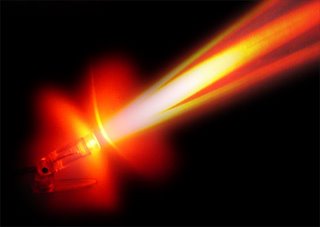Tuesday, January 15, 2008
Will human sight be the worst casualty of future optical warfare?

Posted by John Keller
When the smoke cleared after the American Civil War, many an army veteran on both sides made his way home while missing a hand, an arm, or a leg. It was the logical byproduct of weapons technology of the day, before metal-jacketed ammunition had been invented.
The standard .58 caliber Springfield musket fired a bullet of soft lead weighing an ounce and a half. It hit with tremendous kinetic force, started flattening out when it met resistance, and splintered bone beyond repair with grisly efficiency.
Look at the postwar photographs, and you'll see many crutches and empty sleeves. The prosthesis industry -- artificial limbs -- got a big boost after the war (I almost wrote 'got a shot in the arm,' but that would be a poor choice of words) as former soldiers maimed in the war sought to live normal lives.
I've often thought that veterans of future advanced-technology wars might head home with arms and legs largely intact, but suffering from blindness in large numbers. This condition, too, might be the logical byproduct of future optical warfare where battlefield lasers play a huge role.
U.S. military researchers are trying to develop a portable high-power laser known as the "laser crazer" that uses terawatt-class lasers fired in extremely short pulses that are designed to pit and scratch glass lenses in missile seekers, night-vision equipment, and other optical systems to destroy system effectiveness, reports Wired magazine in a story by David Hambling entitled Camera Shy? Pentagon Builds a Portable Lens-Destroying Laser. Reports Wired:
Hambling expands on his story in an item on Wired's Danger Room Blog entitled New Sensor-Blasting Laser: Blinding Brilliance? by speculating that laser crazer technology might be used to blind -- not confuse, but blind -- air-to-air and surface-to-air heat-seeking missiles.
This technology is quite destructive to the glass lenses of optical devices. According to Hambling it "has a peak power of more than a million megawatts, so intense that it warps the air around it. When the beam strikes the target it vaporises the impact site, producing a plasma fireball and a highly destructive shockwave. The end result: a tiny crater barely visible to the naked eye."
It's not lost on me that the naked eye also is an optical lens of sorts. Imagine what a laser crazer would do to the human eye. Now visualize the blind coming back from war. It's not much of a leap.

Posted by John Keller
When the smoke cleared after the American Civil War, many an army veteran on both sides made his way home while missing a hand, an arm, or a leg. It was the logical byproduct of weapons technology of the day, before metal-jacketed ammunition had been invented.
The standard .58 caliber Springfield musket fired a bullet of soft lead weighing an ounce and a half. It hit with tremendous kinetic force, started flattening out when it met resistance, and splintered bone beyond repair with grisly efficiency.
Look at the postwar photographs, and you'll see many crutches and empty sleeves. The prosthesis industry -- artificial limbs -- got a big boost after the war (I almost wrote 'got a shot in the arm,' but that would be a poor choice of words) as former soldiers maimed in the war sought to live normal lives.
I've often thought that veterans of future advanced-technology wars might head home with arms and legs largely intact, but suffering from blindness in large numbers. This condition, too, might be the logical byproduct of future optical warfare where battlefield lasers play a huge role.
U.S. military researchers are trying to develop a portable high-power laser known as the "laser crazer" that uses terawatt-class lasers fired in extremely short pulses that are designed to pit and scratch glass lenses in missile seekers, night-vision equipment, and other optical systems to destroy system effectiveness, reports Wired magazine in a story by David Hambling entitled Camera Shy? Pentagon Builds a Portable Lens-Destroying Laser. Reports Wired:
... the so-called "laser crazer" is designed not to burn up missiles or tanks, but to scratch lenses. It's a portable nonlethal weapon designed to take out enemy optical systems at long range -- ruining an adversary's night-vision gear, sniper scopes and binoculars in a fraction of a second -- by sandblasting their lenses with ultrashort pulses of laser light.
Hambling expands on his story in an item on Wired's Danger Room Blog entitled New Sensor-Blasting Laser: Blinding Brilliance? by speculating that laser crazer technology might be used to blind -- not confuse, but blind -- air-to-air and surface-to-air heat-seeking missiles.
This technology is quite destructive to the glass lenses of optical devices. According to Hambling it "has a peak power of more than a million megawatts, so intense that it warps the air around it. When the beam strikes the target it vaporises the impact site, producing a plasma fireball and a highly destructive shockwave. The end result: a tiny crater barely visible to the naked eye."
It's not lost on me that the naked eye also is an optical lens of sorts. Imagine what a laser crazer would do to the human eye. Now visualize the blind coming back from war. It's not much of a leap.
Comments:
<< Home
Interesting comments about the possibility of blinding people in war zones. I noticed that the cover photo of Military & Aerospace Electronics supplement Electro-Optics depicts a soldier with a belt fed weapon. The bullets are clearly visible as dum-dum rounds, illegal under the rules of land warfare. How'd that happen?
Post a Comment
Subscribe to Post Comments [Atom]
<< Home

